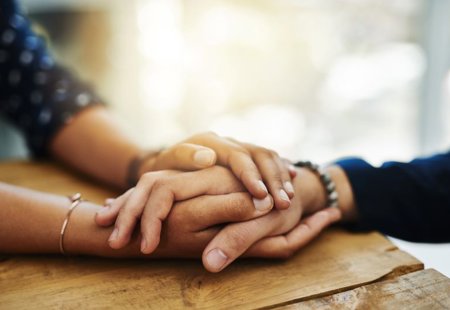Get help and support now
- Call 999 if you're in immediate danger.
- Call us on 0300 456 2531 during office hours or email SafeguardingandDomesticAbuse@futureshg.co.uk. Please leave your details and tell us how and when you'd like to be contacted and we’ll get back to you within one working day.
If you need urgent help but you can’t speak, follow these steps:
- Call 999
- Listen to the questions the operator asks you
- Respond by coughing or tapping your phone if you’re able to
- If prompted, press 55 to let the operator know that it's a genuine emergency and you'll be transferred to the police.
How we can support you
We have safeguarding and domestic abuse coordinators who give confidential support to people who are experiencing domestic abuse.
From enabling you to stay safe in your current home to finding a new one – we’re here to help. We’ll work with you and other organisations where needed to provide the support that’s right for you. Our approach is non-judgmental and it's led by your needs and wishes.
Help is available to all Futures customers, whether you rent or own your home. You can also get advice if you're worried about someone else.
We can help you by:
- Sharing advice on how you can stay safe online.
- Helping you to support children and young people.
- Signposting and/or referring you to other domestic abuse services.
- Creating support and safety plans.
- Giving practical advice, help and support to take action against those who are abusing you.
- Working in partnership with you, the police, local authorities and support services, to ensure your housing, safety and support needs are met.
Domestic abuse helplines
- Derbyshire: 0800 019 8668
- Derby City: 0800 085 3481
- Nottinghamshire: 0808 800 0340
- Northamptonshire: 0300 012 0154
- Leicestershire: 0808 802 0028
Other organisations that provide domestic abuse support.
Are you concerned about your own abusive behaviour? Call Respect on 0808 802 4040 for advice. Calls to this number are free and do not appear on itemised bills.
How to spot domestic abuse
It's not always easy to spot the signs of domestic abuse. The behaviours listed below are examples of different types of abuse that you might be experiencing.
Physical abuse is a key sign of domestic abuse that people spot because it’s visible.
This can include:
- Spitting on you
- Pulling your hair out
- Punching walls or breaking things
- Punching, kicking or hitting you
- Driving irresponsibly when you're in the car
- Holding you down, strangling or choking you.
Emotional abuse includes a perpetrator using words and non-physical actions to hurt, upset, scare or manipulate you.
Examples of verbal and emotional abuse include:
- Screaming and shouting.
- Degrading you by calling you hurtful names or mocking you.
- Threatening to destroy something, hurt you or commit suicide.
- Apologising and saying that it isn’t abuse.
- Saying that you cause or deserve the abuse.
- Threatening to kill or harm you and/or your children.
- Making you feel like your views don't matter.
- Making you feel stupid and saying mean things about your appearance.
- Making you doubt yourself, which is known as gaslighting. This is when a perpetrator tries to convince you that you’re remembering things incorrectly or misinterpreting things.
Financial and economic abuse includes a pattern of control or threatening behaviour related to money and finances. A preparator will control another person’s finances to control their freedom.
Some examples of this include:
- Hiding your purse or wallet.
- Not letting you access your bank account.
- Taking control of your money or spending it without your permission.
- Controlling the household income and keeping financial information secret.
- Taking out credit cards or debts in your name, sometimes without you knowing.
- Stopping you from working, studying or training.
- Not helping with the bills and forcing you to do a certain amount of hours at work.
- Controlling your spending, checking receipts or having everything in their name.
Coercive control is an act or pattern of behaviours which can include one or several types of abuse. These are used to punish, harm or frighten people experiencing domestic abuse.
Some examples of coercive control include:
- Being isolated from friends and family.
- Putting you down and saying you are worthless.
- Being deprived of your basic needs, such as food or care.
- Someone restricting you from accessing medical services, support groups or other support services.
Harassment and stalking is a common form of domestic abuse and includes repeated or obsessive behaviour that cause distress to the victim.
This can include:
- Frequently and inappropriately calling someone’s workplace or home.
- Following someone.
- Sending unwanted or hurtful gifts (for example sending funeral wreaths or flowers to mark the anniversary of an attack).
- Constantly driving past someone’s home.
- Contacting others to try to get information on the victim.
Sexual abuse can be a part of domestic abuse. This includes if you're engaging in certain acts because you feel afraid or you've been pressured into them.
This can consist of:
- Rape or taking away your birth control.
- Being forced to perform sexual acts you didn't agree to.
- Making you have sex with other people or become a sex worker.
- Calling you names, punching, biting or spitting on you during sex.
- Having sex with you when you can't give consent - for example if you're under the influence of alcohol affecting your ability to consent.
- Making you have sex or watch inappropriate content in front of children.
Online or tech abuse is when technology is used as a tool for abuse. Perpetrators may use smart devices to monitor or control you.
Examples of tech abuse include:
- Monitoring your social media accounts.
- Ignoring your right to privacy and having access to your phone, emails or social media accounts.
- Getting access to your online banking account.
- Stopping you from accessing technology (for example stopping you from having a phone or accessing the internet).
- Sharing private photos of you online. The Revenge Porn Helpline can help you if you’ve experienced this form of abuse.
- Using cameras or spyware to monitor you or listen to conversations or using smart home devices to harass you.
- Using GPS software or apps on your phone to track you.
- Excessive contact through text, calls, email and/or social media.
‘Honour’ is important to social standing in some communities. If perceived dishonour or shame affects a family, there can be severe consequences.
Actions that could be considered as ‘dishonourable’ or ‘shameful’ include:
- Being in a relationship with someone your family doesn’t approve of or someone outside your community.
- Getting a divorce or separating.
- Having sex or getting pregnant before marriage.
- Doing things that might be considered as inappropriate (such as dressing differently, talking to certain people and challenging what is expected of you).
- Taking drugs or drinking alcohol.
- Disagreeing with the religion of your family or community.
Honour-based abuse is when someone commits a crime to protect or defend the ‘honour’ of a family or community. This includes:
- All types of domestic abuse or sexual violence.
- Forced marriage or abortion.
- Being pressured to move or visit friends and family abroad.
- Removing someone’s freedom, including restricting access to your phone, the internet or your passport.
- Isolating you from your friends and family members.
The Halo Project supports people who’ve experienced honour-based abuse or violence.
Female genital mutilation (FGM) is a procedure that involves a woman or girl having her external genitalia partially or fully removed, damaged or changed for non-medical reasons.
It’s very painful and can cause constant pain, problems with sex, childbirth and mental health issues. It’s often carried out by people without professional medical training so it can also be life-threatening.
It’s illegal to perform or help with performing FGM in the UK, or to take someone abroad for the procedure. It’s also illegal to pressure a women or girl to carry FGM out on herself or fail to protect a person from risk of FGM.
The Halo Project offers support and advice about female genital mutilation.
Our pledge to Make a Stand
We support the Make a Stand campaign from the Chartered Institute of Housing, Women's Aid and the Domestic Abuse Housing Alliance (DAHA). As a housing association, we’ve signed up to four key commitments on how we can improve our domestic abuse support.
We’re a member of the Domestic Abuse Housing Alliance and we’re working towards DAHA accreditation.
Our policy on domestic abuse
We're committed to providing tailored support to people who are experiencing abuse. Read our policy to find out how we deliver support to those in need.







